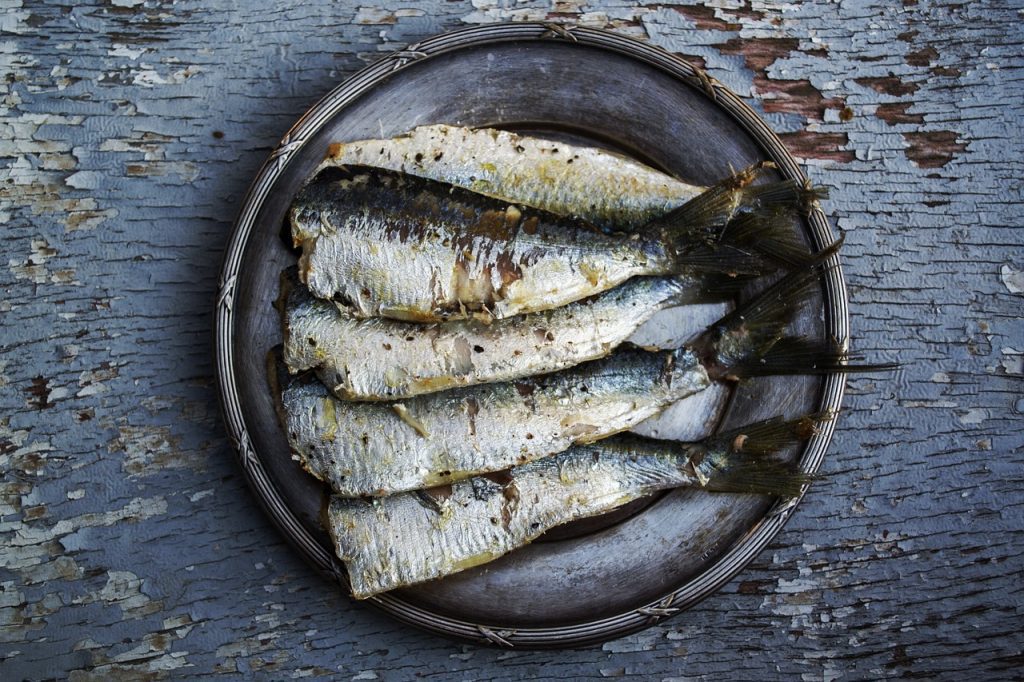
Sardines are packed full of vitamins and minerals as well as heart-healthy omega-3 fatty acids. So why wouldn’t you want to eat them? Well, one reason might be if you suffer with gout. Read on to discover why you might want to think twice about adding them into your gout diet.
Sardines and Gout
The American Heart Association recommends eating a portion of fish at least twice per week. The World Health Organization (WHO) and other countries’ health institutions, such as the United Kingdom’s National Health Service have similar recommendations.
And is it any wonder…
Fish is a low fat, high protein food packed with vitamins, such as vitamin B2 (riboflavin), B3 (niacin), B12 (cobalamin), and vitamins D and E. They’re are also rich in minerals, like calcium, iodine, iron, magnesium, phosphorus, potassium, selenium, and zinc.
And they contain omega-3 fatty acids (good fats) that studies show have several health benefits, for example, boosting heart and brain health as well as reducing the risk of some autoimmune diseases, such as type 1 diabetes and rheumatoid arthritis.
In terms of gout, a study published in Arthritis and Rheumatology in 2019 established an association between omega-3 consumption and a lower risk of recurrent gout flares (attacks).
Another study found that omega-3 fatty acids have anti-inflammatory properties that may help gout (a form of inflammatory arthritis).
Oily fish (also referred to as fatty fish) such as sardines, herring, tuna, mackerel, and salmon, are especially rich in omega-3 fatty acids, which is why many experts recommend that one of your two portions of fish per week should be oily fish.
But what about sardines’ purine content?
Purines are naturally occurring compounds in our body’s cells and the cells of the food we eat. When they breakdown as part of the body’s metabolism, uric acid is produced and circulates in the bloodstream. Uric acid is normally processed by the kidneys and excreted from the body via urine.
However, should uric acid levels become unnecessarily elevated, microscopic needle-like crystals of monosodium urate can appear out of the acid and settle in the joints and connective tissue. The body’s natural inflammatory response to these crystals produces the painful symptoms of a gout attack.
Therefore: the more purines we consume…the more uric acid is produced…the more the risk there is of a gout attack.
So we gout sufferers need to know the purine content of the food we eat. In the case of fish:
- some are high in purines which we are advised to completely avoid.
- some have only moderate amounts of purines that we can consume in moderation.
- there are some species which are relatively low in purines and thus safe to eat.
Where do sardines fit in?
Sardines are a high-purine food, meaning they produce more than 200 mg of uric acid for each 3.5 oz (100 g) serving. So, on the face of it, we gout sufferers should completely avoid them.
But, as we’ve seen, oily fish are packed full of health-giving nutrients, especially in essential omega-3, which some argue outweigh their gout risk. This argument would have merit if oily fish were the only source of omega-3. But, of course, they aren’t.
Since the body doesn’t make omega-3 we have to get it from our food. However, we don’t need to eat high-purine oily fish like sardines, we can get our omega-3 from other (lower purine) food sources such as:
- nuts (e.g., walnuts)
- seeds (e.g., flaxseed)
- vegetable oils (e.g., canola oil)
- dark green leafy vegetables (e.g., kale)
- fortified foods that have had omega-3 added (e.g., some breads, milk, yogurt, and eggs)
Not only that, and luckily for us gout sufferers, some oily fish (such as salmon) have moderately-high amounts of purines, so may be consumed safely, as long as you don’t go overboard (see below).
Conclusion
We need omega-3 for our general health and wellbeing. That’s a given. And there is some evidence that omega-3 may be helpful for gout too.
So how do we get the highly beneficial omega-3 we need without triggering recurrent gout attacks?
We gout sufferers don’t need high-purine fish, like sardines, mackerel, herring, and anchovies, for our omega-3. Instead we can get the benefits of omega-3 and reduce the risk of gout by eating a wide range of plant-based and other foods containing omega-3.
And fish sources of omega-3 aren’t totally out of the question either. There are some fish — salmon being one — that contain only moderate amounts of purines. And, interestingly, salmon has higher concentrations of omega-3 than sardines!
Note, though, that smoked salmon must be avoided as it is high in purines. Cooked and canned salmon are fine as long as they’re only consumed in moderation: 1 x 3.5 oz (100 g) serving per week. Your second weekly fish dish could come from low-purine fish, like monkfish and plaice.
So there are plenty of gout-healthy alternatives to sardines.
Having said that, I know there are many people who love sardines, perhaps you are one. I certainly do. Luckily, I’ve found I can eat a grilled sardine or sardine on toast every two or three months or so, without any problems. On those days I make sure all other meals are definitely low purine; not even moderately low.
But everyone’s metabolism is different and that might not work for you.
The safest course of action is to completely avoid sardines. You can still get your WHO recommended two portions of fish per week without eating sardines and without raising your risk of recurrent gout attacks.
[My “Gout Rescue” guide contains detailed listings for the purine content of hundreds of different foods. Click or tap here for details.]



